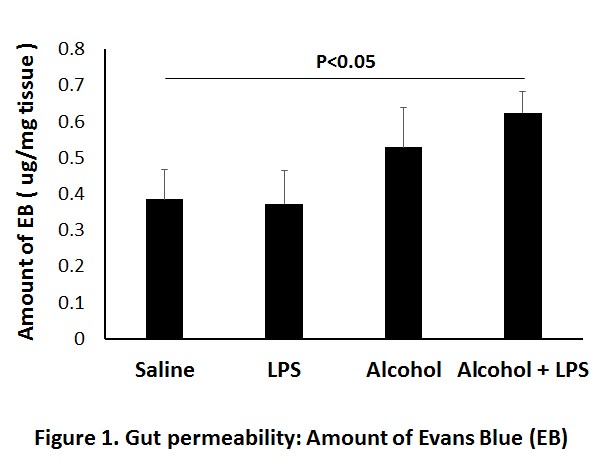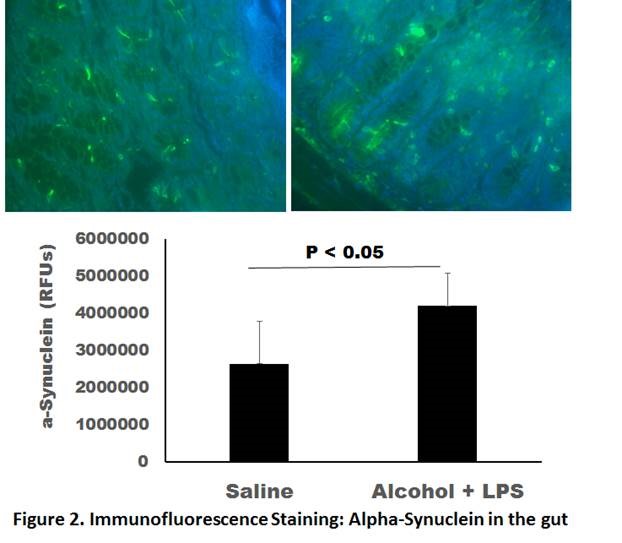Session Information
Date: Tuesday, September 24, 2019
Session Title: Parkinsonisms and Parkinson-Plus
Session Time: 1:45pm-3:15pm
Location: Agora 3 West, Level 3
Objective: We postulate alterations of the intestinal barrier (or leaky guts) enhances inflammation, as well as the production of alpga (α)-synuclein which has characteristic pathological changes in Parkinson’s Disease (PD). To heighten our hypothesis we have developed an animal model of gut injury/permeability by oral administration of alcohol followed by lipopolysaccharide (LPS) to enhance absorption.
Background: The Gut-Brain-Axis may be associated with gastrointestinal manifestations preceding disorders of cognitive and/or learning process, supporting the hypothesis the pathological process in PD is spread from the gut to the brain. In previous reports, we showed that exposure to lipopolysaccharide (LPS) to rats exhibits many features associated with early neurodegeneration, including increases in cytokine production, synthesis of neurotrophins, NOS isoforms, α-synuclein aggregates and immune cell infiltration in the olfactory bulb [1,2]. We also discovered LPS-induced endotoxicity to be associated with prevalence of Proteobacteria and low proportion of Firmicutes phyla suggesting dysbiosis.
Method: To induce gut injury (leaky guts), both alcohol (ethanol) and LPS were administered by gavage. Rats were divided into 4 groups. Eight rats were included in each group. Animals of Group 1 received by gavage 40% (5 g/kg body weight) of alcohol (ethanol; [3] and LPS (2 mg/kg body weight; [4]). 3 gavages were performed per week over 1 month. Group 2 received LPS alone and Group 3 received alcohol alone. Finally, Group 4 (control) received saline (0.5 ml). All treatments were administered by gavage as described in Group 1. Based on previous studies the target size of 8 rats per group have provided 90% power analysis. To assess the overall significance, data were analyzed by a one-way or two-way ANOVA, when appropriate, followed by Dunnett’s post hoc.
Results: Although LPS did not increase gut permeability, our data show that the combination of LPS and alcohol significantly increased the gut permeability by 45% (Figure1). As depicted in Figure 2, our data show that LPS combined with alcohol generated an increase in alpha-synuclein in the gut as compared to control (saline). Additional experiments are being performed in the rat’s brain.
Conclusion: Although our data are preliminary, we are confident we have developed a leaky guts model, leading to understand the Gut/Brain Axis modulation in neuro-degenrative diseases such as PD.
References: [1] Doursout, M.F., et al. Open Neurol J 10:67-76. PMC5009294, 2016 [2] Doursout, M.F. et al. J Interferon Cytokine Res 33(7):376-83, 2013 [3] Chang, B., et al. BMC Gastroenterology 13:151. 2013 [4] Inagawa, H., et al. Anticancer Research 31: 2431-2436, 2011
To cite this abstract in AMA style:
M. Schiess, M. Doursout, J. Campo, Z. Peng, A. Sundaresan, S. Umar. Long-Term Effects of LPS and Alcohol in Rats: A Model of Neuro-Degenerative Disease [abstract]. Mov Disord. 2019; 34 (suppl 2). https://www.mdsabstracts.org/abstract/long-term-effects-of-lps-and-alcohol-in-rats-a-model-of-neuro-degenerative-disease/. Accessed December 31, 2025.« Back to 2019 International Congress
MDS Abstracts - https://www.mdsabstracts.org/abstract/long-term-effects-of-lps-and-alcohol-in-rats-a-model-of-neuro-degenerative-disease/


